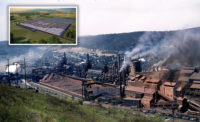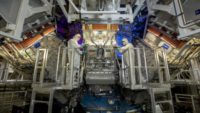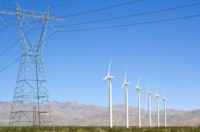Seeking to stimulate domestic electric vehicle production, the U.S. Dept. of Energy is providing hundreds of millions in new loans for U.S. advanced battery component manufacturing plants now being built.
DOE announced in July a $2.5-billion conditional loan to a General Motors Corp. joint venture with South Korea's LG Solutions that now has three large battery cell plants under construction, each about 2.8 million sq ft in size and costing from $2.3 billion to $2.6 billion. DOE said its loan, which could close in two months, would be the first for a battery cell manufacturing project under the agency’s Advanced Technology Vehicles Manufacturing program.
The first plant, in Lordstown, Ohio, is set to begin battery production this month to supply electric vehicles being made at two GM Michigan plants, said the JV, called Ultium Cells LLC. Another facility, in Spring Hill, Tenn., is set to oomplete construction in late 2023 and will serve nearby GM vehicle production. Gresham Smith is the plants’ design firm, with Barton Malow serving as contractor for the Spring Hill facility.
Site construction also has begun for the third plant in Lansing, Mich., with battery cell production set to begin in late 2024. GM CEO Mary Barra said earlier this year that the firm could announce a fourth plant location in 2022.
DOE also said last month it closed a $102.1-million loan to Australia-based Syrah Technologies LLC for expansion of its Vidalia, La., facility that produces graphite-based active anode material, a critical component of lithium-ion batteries. The estimated $176-million project will add 180,000 sq ft to the plant’s existing 50,000 sq ft.
DOE said Syrah “is the only vertically integrated, large-scale AAM manufacturer outside of China, and the [Vidalia plant] is the first of its kind in the U.S.” Construction is targeted to finish by mid-2023, with Worley Group hired to provide detailed engineering and procurement services.
CEO Shaun Verner also told analysts on July 20 that construction of the 11,250 ton-per-year facility is expected to finish "in the June 2023 quarter," with production startup targeted for September 2023. The company noted an agreement with Tesla to provide AAM for use in batteries. Verner said the firm is "strongly advancing" long-term contract talks with target customers he identified as EV and battery cell manufacturers, primarily in the U.S. and Europe.
Verner said the firm "is considering a potential expansion of its downstream business into Europe," noting that lithium-ion battery manufacturing capacity there is forecast to approach 500 gigawatt hours per year which would require more than 375,000 tons annually of AAM. He added that capacity planning and investment to produce the material is in early stages.






Post a comment to this article
Report Abusive Comment